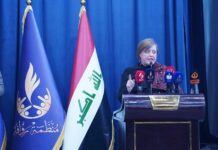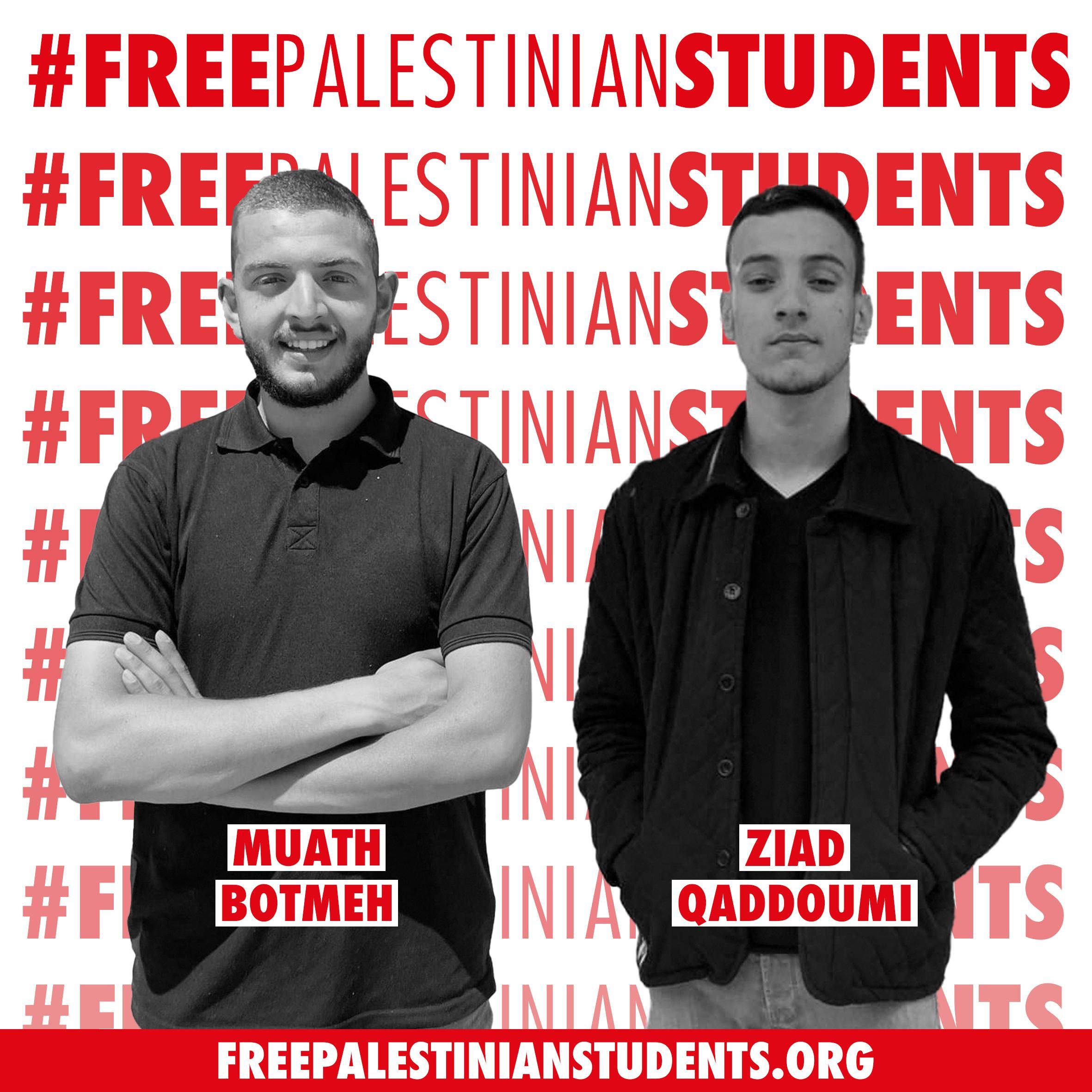
On Friday, September 16, Israeli occupation forces seized 23 Palestinian students — part of the Progressive Democratic Student Pole, the leftist student organization at Bir Zeit University, while they were on a group trip to Aboud village west of Ramallah. Occupation forces then kept 11 jailed and under interrogation for several days until Monday, 19 September, when eight of the remaining students were released, while two leaders of the Progressive Democratic Student Pole, Muath Botmeh, the Coordinator of the Student Pole, and Zaid Qaddoumi , the Secretary of the Student Pole, were ordered jailed without trial under “administrative detention.”
Meanwhile, fellow Palestinian student Ibrahim al-Nabali remains detained and will be brought before an occupation military court on Wednesday, 21 September.

Botmeh and Qaddoumi are now among over 740 Palestinians jailed without charge or trial under administrative detention, out of a total of 4,650 Palestinian political prisoners in Israeli occupation prisons. Currently, 30 administrative detainees have announced that they plan to launch a collective hunger strike in the coming days to bring an end to this policy of detention without charge or trial.
Administrative detention was first introduced to Palestine by the British colonial mandate before being adopted by the Zionist project. Detention orders can be issued for up to six months at a time and are indefinitely renewable, with many Palestinians spending years at a time jailed under administrative detention, and neither they nor their families and communities are ever sure when they will be released, an additional form of collective punishment and psychological torture.
Botmeh and Qaddoumi are among hundreds of Palestinian students, including dozens from Bir Zeit University alone, jailed by the Israeli occupation.
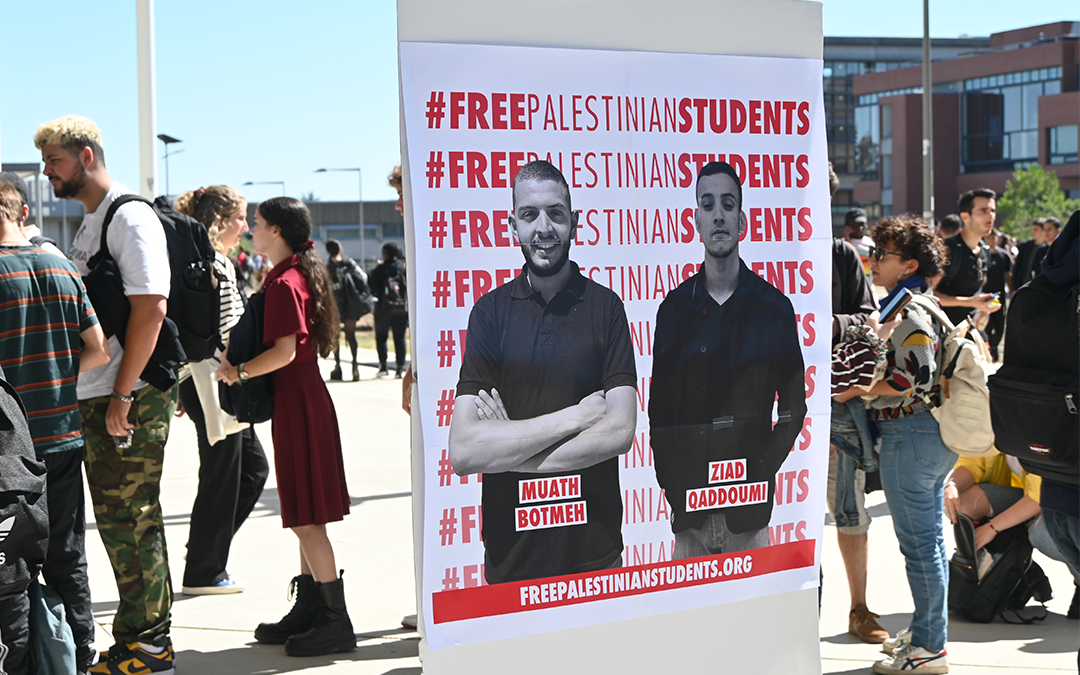
On Tuesday, 20 September, the Collectif Palestine Vaincra — a member organization of the Samidoun Network — held a Palestine stand at the campus of Jean Jaurès University in Toulouse, France, to welcome students back to school.
https://twitter.com/Collectif_PV/status/1572178491939979265
The stand included a large banner calling for the release of all imprisoned Palestinian students as well as a sign calling for the release of Botmeh and Qaddoumi. Organizers distributed hundreds of flyers and stickers to students, receiving an enthusiastic welcome.
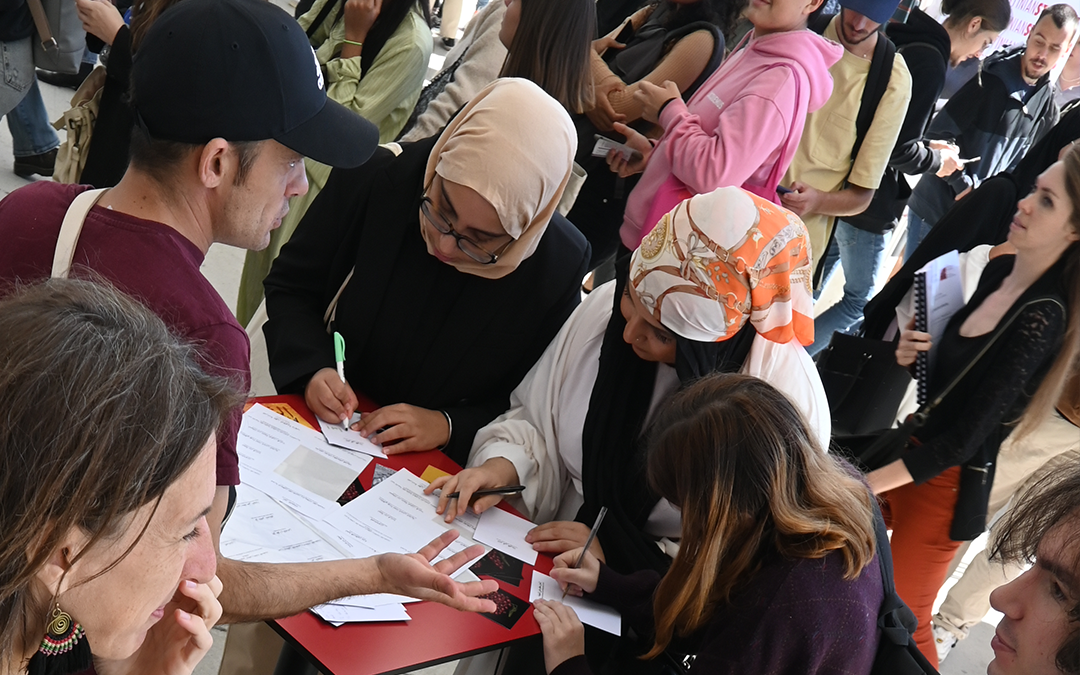
Almost 40 students came to the stand to write cards of support to be sent to the imprisoned students, their families and fellow students. One young Algerian woman wrote, “Militant greetings and love to our heroes, you are the symbols of sumoud and strength. You will soon be victorious inshAllah, may God make my children heroes like you.”
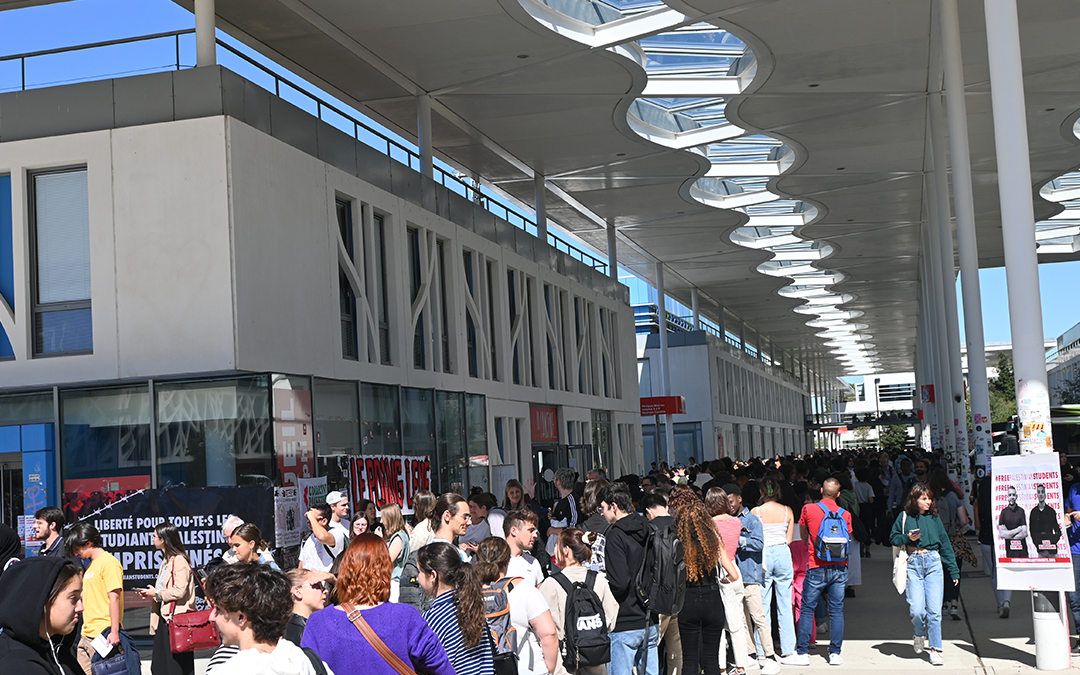
Another student wrote, “Continue your fight to obtain your freedom with all courage and with all of our support from the University of Toulouse.” A young Syrian student wrote: “We are with Palestine, even if we do not have Palestinian blood: Palestine is our homeland.”
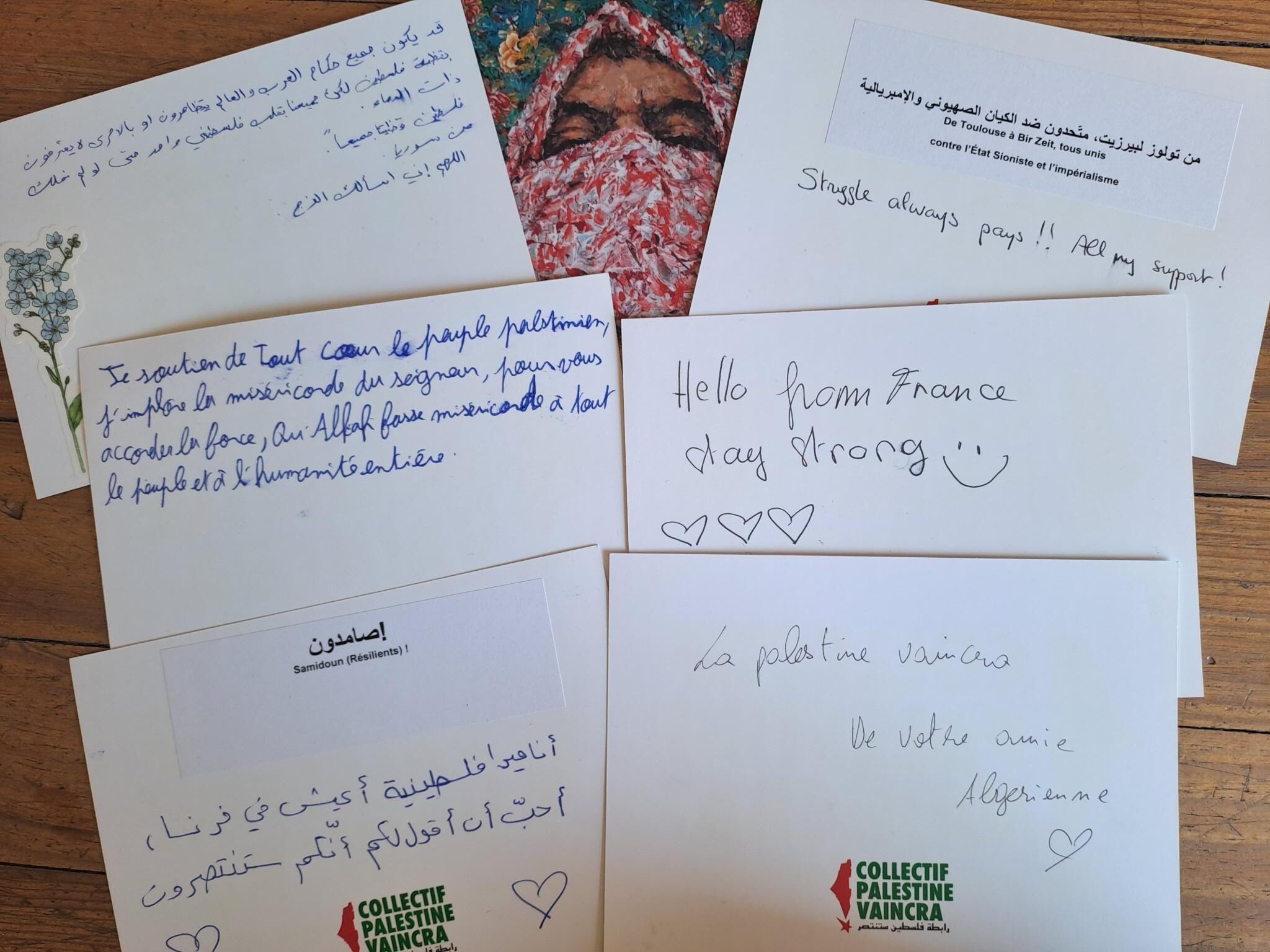
As noted in the Free Palestinian Students campaign supported by hundreds of Palestinian, Arab and international organizations,
“The work of student organizing, from holding book fairs to organizing events and participating in student elections, is criminalized by the Israeli occupation. Still more students are detained for joining demonstrations or posting on their social media profiles.
Palestinian students have been seized by Israeli occupation forces and abducted for their participation in the student movement in their homes, at their workplaces and on their campuses.
Once arrested, Palestinian students are routinely subjected to torture under interrogation — subjected to stress positions and stretched out over chairs, suspended from walls and forced to stand on tiptoe, deprived of sleep, cuffed and pressured on injured limbs, and beaten.
Palestinian students may be sent to administrative detention — imprisonment without charge or trial, indefinitely renewable in six-month periods. Palestinians routinely spend years jailed with no charges, no trial and no real challenge to the deprivation of their rights. They may be brought before Israeli military courts, which convict over 99% of the Palestinians charged there.
One of the most common charges is “membership in a prohibited organization,” typically referring to the student blocs. These represent the full spectrum of Palestinian politics. They organize lectures, book fairs, rallies and other campus events and participate in student elections. The charge sheets often refer to these standard activities of campus life, which are widely interpreted as a barometer for broader Palestinian political opinion.
The targeting Palestinian students is an attack on Palestinian futures. It is a systematic attempt to undermine the capacity of young Palestinians to organize with one another for a liberated future for their people: One free of colonization, apartheid and occupation.”
Take action to support imprisoned Palestinian students:
Writing Solidarity Letters
Palestinian prisoners and detainees repeatedly report that receiving letters from supporters around the world boosts morale and provides them with support. Israel wants to isolate Palestinian student leaders by keeping them behind bars, and letters help to break their isolation. This is a simple activity that can be done with physical distancing or combined with other prisoner support efforts. Contact us at samidoun@samidoun.net for a physical mailing address, or send us your letters — Samidoun in Occupied Palestine will share directly with the families and lawyers of detained students.
Adopt a Prisoner
Share the stories of Palestinian student detainees with your community by “adopting” a prisoner. Share their stories, write letters to them and include their name and photo in your activities. Above, we’ve presented 25 student prisoners, and we’ll be continuing to share their stories and photos throughout this campaign. Please contact us at samidoun@samidoun.net for even more info on your organization’s adopted prisoner.
Boycott Israel! Build the Academic Boycott
The academic boycott of Israel is a global call from Palestinian organizations, including student and faculty unions. As noted by the American Studies Association, “Israeli academic institutions function as a central part of a system that has denied Palestinians their basic rights. Palestinian students face ongoing discrimination, including the suppression of Palestinian cultural events, and there is sanctioning and ongoing surveillance of Palestinian students and faculty who protest Israeli policies. Israeli universities have been a direct party to the annexation of Palestinian land. Armed soldiers patrol Israeli university campuses, and some have been trained at Israeli universities in techniques to suppress protestors.”
As noted by the US Campaign for the Academic and Cultural Boycott of Israel, “The academic boycott calls for an end to collaboration with and normalization of Israeli academic institutions, which are mostly state-controlled as well as complicit with Israeli occupation and apartheid. The overwhelming majority of Israeli intellectuals and academics have either contributed directly to maintaining, defending or otherwise justifying the above forms of oppression, or have been complicit in them through their silence. No Israeli academic institution or organization has ever taken an official collective stance in opposition to the Israeli state’s occupation and wars.
Students and faculty can play an important role in supporting the academic boycott and standing in solidarity with Palestinian students and academics whose right to education and academic freedom is denied by Israel. They can do so by organizing a range of activities and campaigns; for example:
- Opposing Study Abroad in Israel programs that are based in Israeli academic institutions and in doing so, exposing the complicity of Israeli universities with occupation and apartheid. Palestinian students in Israeli universities are also routinely subjected to racial harassment, surveillance, censorship,and disciplining .Such campaigns can highlight the restrictions on the freedom of travel and violations of academic freedom of Palestinian scholars and students as well as the lack of freedom experienced by Palestinian, Arab, and Muslim international students and scholars, who face restrictions when attempting to travel through Israeli borders for study, research, or academic exchange.
- Passing a resolution in your academic association or student government society or faculty or graduate student union in support of the academic boycott.
- Challenging the collaboration between academic programs at UScampuses and Israeli academic institutions and research institutes as a violation of the academic boycott.
- Asking your university to support Palestinian academic and cultural institutions directly without requiring them to partner with Israeli counterparts as an explicit or implicit condition for such support.
- Protesting talks by Israeli state officials or official representatives of Israeli academic institutions such as presidents, rectors or deans.
- Opposing programs on campus to address the “Middle East conflict” that contract with anti-Palestinian organizations such as the Anti-Defamation League (ADL) or the Simon Wiesenthal Center (Museum of Tolerance).Such organizations are also often involved in diversity and dialogue programs on campus and partner with student affairs offices.
- Asking your administration or President/Chancellor to issue a public statement censuring Israeli destruction of Palestinian schools and universities and interference with Palestinian education, archives and re-search centers, for example, during the many wars on Gaza, and on an ongoing basis throughout occupied Palestine.
- Organizing teach-ins or events with campus and community organizations at which the campaign for the economic, cultural and academic boy–cott of Israel can be fully and openly discussed, in addition to divestment.”
Protest, Rally and Organize
Organize a protest or direct action! The United States, Canada, EU states, Australia and Britain, among others, provide ongoing military, economic, diplomatic and political support to Israel to continue the repression of Palestinian students. Protest on your campus or in your city, highlighting government and media complicity, or act and organize at Israeli embassies, corporations and institutions in your area. Bring our materials to highlight the student prisoners’ situation while rallying for Palestinian liberation. We will be producing stickers and postcards for this campaign – email samidoun@samidoun.net to order some for your organization!
Join the Social Media March to #FreePalestinianStudents
You can support Palestinian students on social media as well. Use our materials and student prisoner photos on your individual or group social media pages, on Instagram, Facebook or Twitter. Take a selfie or a group photo with our posters or just post these images with a message of your own. Use the hashtag #FreePalestinianStudents.
Pass a Resolution
Academic associations, labor unions and student governments have passed resolutions calling for boycott, divestment and sanctions against Israel, including divestment from complicit corporations and the academic boycott of Israel. Large student coalitions have been built to oppose racist police and investment in arms dealers and environmental destruction. Include the student prisoners in your resolution or pass a resolution specifically calling for freedom for imprisoned Palestinian students. Use the information in the call and resources to build your resolution! For further support, email samidoun@samidoun.net.
Discover more from Samidoun: Palestinian Prisoner Solidarity Network
Subscribe to get the latest posts sent to your email.

